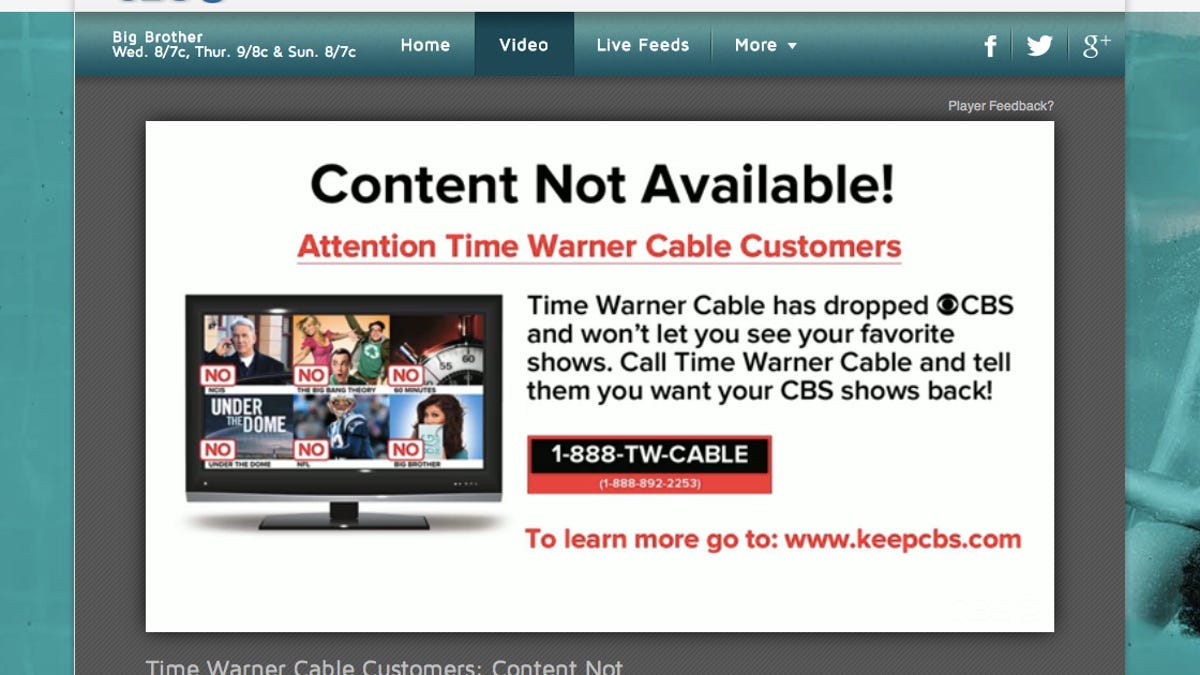CBS head calls Time Warner digital rights offer 'egregious'
Les Moonves, CEO of CBS, says Time Warner Cable is asking the broadcaster to either give it digital programming for free or inhibit licensing deals with the likes of Amazon.

In the latest retort between CBS and Time Warner Cable, the broadcaster's chief executive says the latest terms for digital rights offered by the cable company are "the most egregious" of its proposals to end their four-day blackout.
CBS is the parent company of CNET.
Chief Executive Les Moonves said in a response letter Tuesday to his counterpart at Time Warner that the cable company is asking either to inhibit CBS from licensing content to online competitors and new emerging companies or to gain the right to that content for free while others pay for it.
"Those terms and conditions, better known as rights, were established in 2008. That was before the introduction of the iPad. Netflix was still doing little but mailing out DVDs. Amazon was known simply for selling books. This doesn't even begin to account for the new entrants now coming up the ramp who are interested in paying a fair price for the most desirable programming," Moonves wrote.
In response, Time Warner Cable spokeswoman Maureen Huff said Tuesday that her company is disappointed that CBS "offered no solutions" whereas Time Warner has offered two. "Our offer was sincere and they still haven't addressed the blocking of CBS.com," she said.
Digital rights have taken on a heightened importance for CBS this year, following the success of its unique licensing agreement with Amazon for a summer sci-fi drama "Under the Dome." In order to create an expensive scripted program during the summer season, when advertising rates alone aren't lucrative enough to support the cost of such a show, CBS agreed to license it to Amazon's Prime Instant Video service just four days after episodes air. That, combined with the program's international sales, made "Under the Dome" profitable before anyone had seen it.
It has since been a summer hit, bringing in additional profits. Last week, Moonves said he expects the model will be replicated.
In his Tuesday letter, Moonves also criticized Time Warner's suggestion that CBS agree to an a la carte offering of its channels as "an empty gesture."
"Please return to the negotiating table and talk about the real issues that separate us," he said.
On Monday, a letter to Moonves from Time Warner Cable Chief Executive Glenn Britt proposed an immediate end to their dispute with two options: one that would continue their old agreement under new economics but crimped digital rights, and another that would let CBS set prices for its channels and allow consumers to pick and choose what to pay for, known as a la carte. Time Warner also blasted the media giant for blocking online content from its broadband subscribers.
Since the two sides failed to reach a deal on retransmission fees Friday, Time Warner subscribers in New York, Dallas, and Los Angeles have lost access to the CBS broadcast network, and CBS cable channels like Showtime have gone dark for its customers everywhere.

